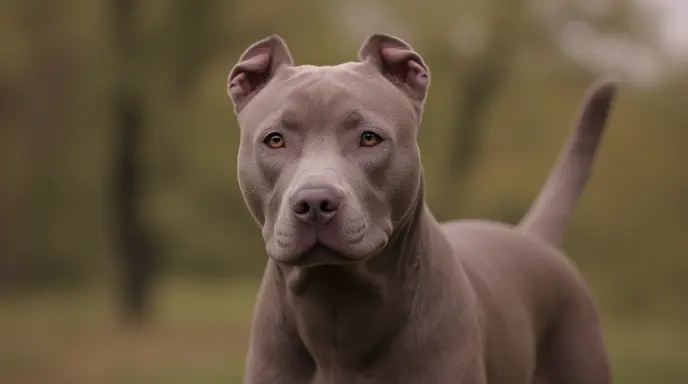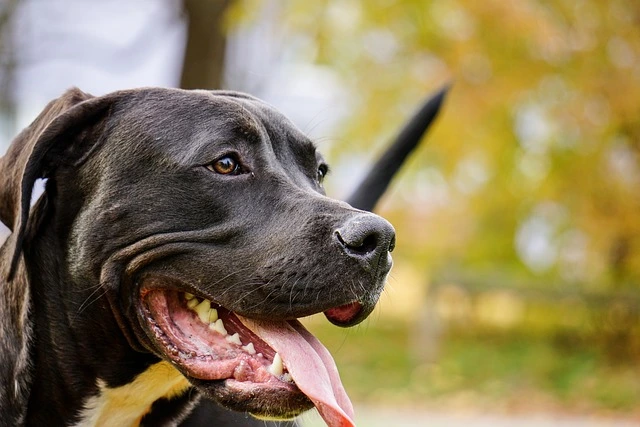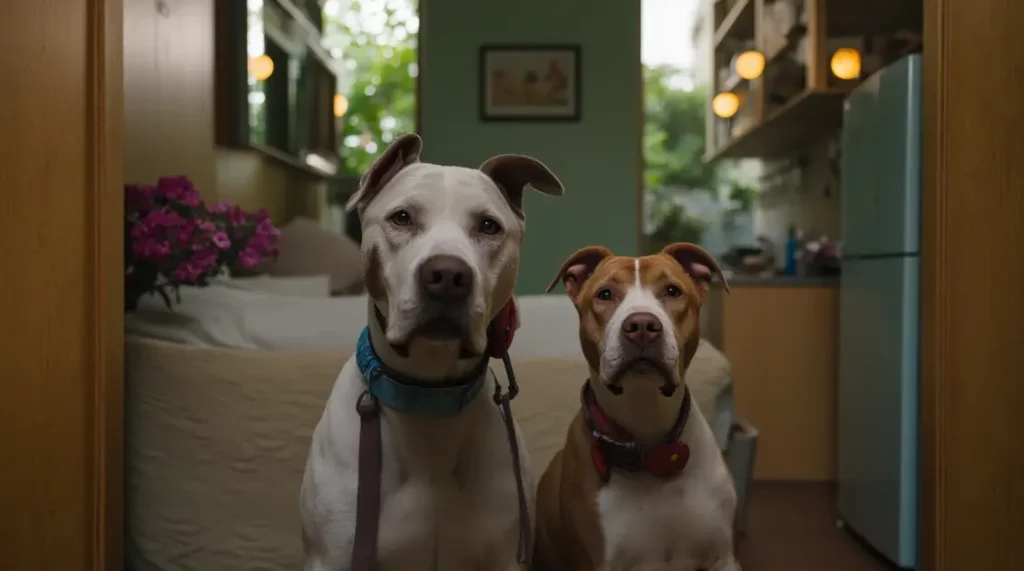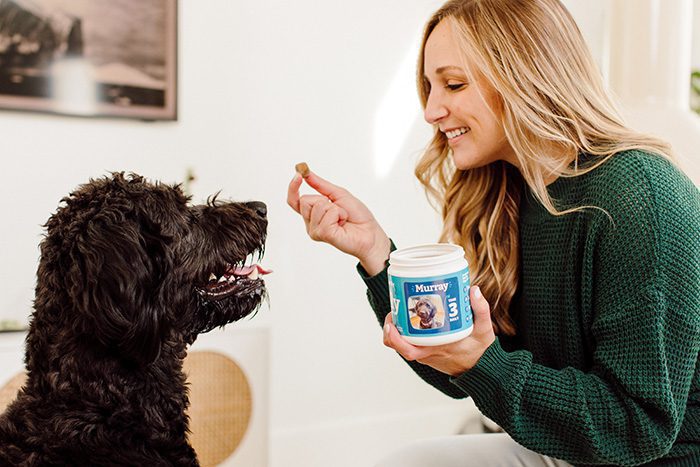Are you thinking about welcoming a blue nose pitbull into your life? These dogs are undeniably eye-catching with their unique coat color, but there’s much more to them than meets the eye. This guide will explore everything you need about blue nose pitbulls, from their temperament and health concerns to training tips and responsible ownership practices.
What is a Blue Nose Pitbull?
Dispelling the Myth: Blue Nose Pitbulls vs. Other Pitbulls
A blue nose pitbull isn’t a separate breed. It’s simply a color variation of the American Pitbull Terrier or sometimes the American Staffordshire Terrier. The term “blue nose” refers to their grayish-blue coat and nose, a result of a recessive gene that affects pigmentation.

History and Origin of Blue Nose Pitbulls
Pitbull-type dogs have a history dating back to 19th-century England, where Bulldogs and Terriers were crossed to create dogs for bull-baiting and, unfortunately, dog fighting. Thankfully, those barbaric bloodsports are now illegal, and Pitbulls have evolved into companion animals. The blue nose variation likely emerged through selective breeding, emphasizing the recessive color gene.
Physical Characteristics
The Blue Coat: Genetics and Health Considerations
The distinctive blue coat and nose come from a recessive gene, meaning both parents must carry the gene for a puppy to inherit it. While beautiful, this breeding practice can lead to health concerns, particularly skin issues, due to the reduced genetic diversity.
Size and Appearance
Blue nose pitbull share the same physical characteristics as other Pitbull types. They’re medium-sized, muscular dogs with a powerful build. They typically weigh between 30 and 60 pounds and stand 18 to 21 inches tall.
Blue Nose Pitbull Temperament and Personality
Affectionate and Loyal Companions
Blue nose pitbulls are known for their loving and loyal nature. They form strong bonds with their family members and crave affection and attention. Their playful and goofy personalities make them a joy to be around.
Playful and Energetic Nature
These dogs are bundles of energy and require plenty of exercise and mental stimulation. Daily walks, playtime, and interactive games are essential to keep them happy and healthy..
Intelligence and Trainability
Blue nose pitbulls are intelligent and eager to please, making them relatively easy to train. They respond well to positive reinforcement methods and enjoy learning new tricks.
Separation Anxiety and Boredom
Blue nose pitbulls, like many other breeds, can be prone to separation anxiety and boredom. They thrive on companionship and can become destructive if left alone for long periods without enough mental and physical stimulation.
Addressing the Stigma of Aggression
Unfortunately, Pitbulls often face unfair stereotypes about aggression. While any dog can display aggression with improper training or abuse, blue nose pitbulls are not inherently aggressive.
Importance of Early Socialization
Socialization is crucial for any puppy, especially blue nose pitbulls. Early and positive exposure to various people, animals, and environments can help them develop into well-adjusted dogs.
Responsible Ownership Practices
Responsible ownership is key to dispelling myths and ensuring the well-being of blue nose pitbulls. This includes spaying/neutering, obedience training, secure fencing, and promoting positive interactions with the breed.

Caring for Your Blue Nose Pitbull
Exercise Requirements
Blue nose pitbulls need at least 90 minutes to 2 hours of exercise daily. This can include walks, jogs, playtime, or engaging in activities like agility training.
Training Tips and Techniques
Positive Reinforcement Methods
Use positive reinforcement techniques like rewards and praise to motivate your blue nose pitbull during training. Avoid harsh punishments, as they can damage their trust and make them fearful.
Basic Obedience and Socialization
Enroll your blue nose pitbull in obedience classes to teach them basic commands and appropriate social skills. Early socialization is vital for preventing behavioral issues.
Grooming Needs
Blue nose pitbulls have a short, low-shedding coat that requires minimal grooming. A weekly brushing and occasional baths are usually sufficient. Don’t forget regular nail trims and ear checks.
Dietary Recommendations
Feed your blue nose pitbull a high-quality dog food formulated for medium-sized, active breeds. Consult your veterinarian for the appropriate amount based on your dog’s age, weight, and activity level.
Health Concerns and Considerations
Common Health Issues in Blue Nose Pitbulls
Skin Allergies: Causes and Management
Blue nose pitbulls are susceptible to skin allergies due to their reduced genetic diversity. Using a hypoallergenic shampoo and managing flea and tick infestations can help. You may need to consult a veterinarian about potential food allergies as well.
Hip Dysplasia: Prevention and Treatment
Hip dysplasia, a condition affecting the hip joint, is common in Pitbulls. Maintaining a healthy weight and providing joint supplements can help manage this condition, but it’s essential to consult your veterinarian for guidance.
Other Potential Health Problems
Blue nose pitbulls can also experience other health issues, such as hypothyroidism and eye conditions like cataracts. Regular veterinary checkups are essential for early detection and treatment.
The Role of Inbreeding
Breeding practices focused solely on producing the blue coat can lead to inbreeding, increasing the risk of genetic health problems. It’s crucial to choose a reputable breeder who prioritizes the health and well-being of their dogs.
Is a Blue Nose Pitbull Right for You?
Assessing Your Lifestyle and Capabilities
Consider your lifestyle and capabilities before bringing a blue nose pitbull into your home. They are high-energy dogs that require a commitment to exercise, training, and socialization.
Finding a Reputable Breeder or Rescue
Adoption Considerations
If you decide a blue nose pitbull is right for you, consider adoption from a shelter or rescue organization. You might find a loving companion in need of a forever home.
Conclusion
Blue nose pitbulls are loving, intelligent, and energetic dogs capable of enriching our lives. By understanding their needs, providing proper care, and promoting responsible ownership, we can help them thrive and dispel the negative stereotypes surrounding this often misunderstood breed. Remember to consult your veterinarian for personalized advice on your blue nose pitbull’s health and well-being.



